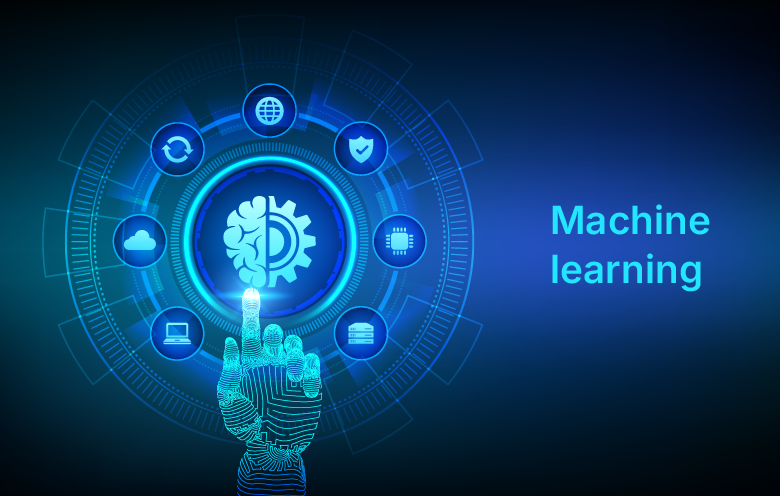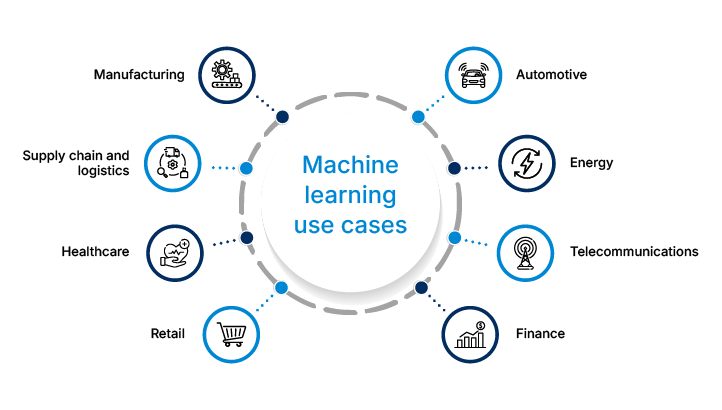

Machine Learning (ML) technologies are radically changing the functioning of businesses. With the improvement in artificial intelligence and ML algorithms, computers can now analyze large datasets with ease and efficiency, and this has enabled organizations to handle lots of information quickly. Furthermore, the improvement in machine learning solutions and capabilities has enabled better customer behavior and market trend prediction.
The use of machine learning is continuously growing. Healthcare, retail, finance, and other industries use machine learning services to gain new insights and enhance their operational effectiveness. With so much potential and chances to utilize ML, let’s discuss some of the most prevalent machine learning applications and use cases across industries.
As per a Harvard Business Review report:
- 49% of organizations utilize ML and AI to identify sales prospects
- 48% leverage these technologies to gain a deeper understanding of their prospects and customers
- 67% of respondents believe that ML and AI will be critical for future competitive advantage in marketing and sales
Accelerate your business with machine learning
Elevate your business with our innovative machine learning solutions. Harness the power of data to drive growth and efficiency. Get in touch today to start your transformation journey!

Machine learning use cases for various industries

Machine learning use cases in manufacturing: Enhancing efficiency and reducing downtime
Perhaps the most significant uses of machine learning are from the manufacturing sector. Machine learning algorithms are increasingly being used to predict maintenance needs and optimize production processes. Downtime due to equipment failure can result in catastrophic losses in revenue.
- AI/ML-powered predictive maintenance can scan sensor data.
- ML can forecast when equipment is likely to fail.
- It enables significantly shorter downtime, if any.
- AI image recognition detects small manufacturing defects that can lead to huge issues for end users.
- By automating repetitive work in quality control or data entry using AI, workers can be employed to do more creative tasks such as creating new products or improving strategies.
Supply chain and logistics optimization: Smarter inventory and delivery
Any manufacturing process’s success is based on how efficiently the supply chain is controlled. In this area also, ML has something to offer. Predictive analytics driven by ML can foretell raw material availability and demand variations for a given product weeks in advance.
- Predictive analytics allows you to streamline inventory levels and logistics.
- Efficient supply chains mean you have the correct materials on hand at the correct time.
- Delivery routes and schedules can be optimized and lead to lower transportation costs and quicker delivery times.
- ML application in supply chain management allows manufacturers to be more responsive to market fluctuations, save money, and become more efficient overall.
Machine learning in healthcare: Improving patient outcomes
The real-time imaging made possible through AI/ML in healthcare can assist in accelerating and enhancing the precision of the diagnostic process for patients. In addition, being able to diagnose with more accuracy using data sets can also assist clinicians in customizing a more individualized treatment plan for patients, which can result in better outcomes and patient experience.
- AI/ML can also contribute to drug development.
- AI can imitate molecules and make predictions on how drugs will work during the process of development prior to anything actually being manufactured.
- Patients also benefit from AI/ML in the everyday medical environment through AI chatbots that can respond to frequently asked questions and offer basic advice.
Machine learning in retail: Elevating the customer experience
Customers are more likely to abandon a retail website if they don’t show the products that correspond to their interest. AI can make customer experience more tailored through offering personalized product suggestions based on historical purchasing behavior and previously expressed customer interests.
- Inventory management is a tightrope walk for every retail company.
- AI/ML technology, such as predictive AI, can reduce waste
- It can satisfy demand by forecasting what product lines will be top sellers, managing levels to minimize overstocking and selling out.
What is AutoML: Transforming business with advanced machine learning solutions
Discover how AutoML is revolutionizing businesses by automating machine learning processes. Learn about its benefits, applications, and how it can drive innovation and efficiency in your organization.
Autonomous vehicles: Driving toward a safer, smarter future
The concept of autonomous vehicles used to be a sci-fi notion, but with the advent of ML, it became a reality. Increasing numbers of cars are now equipped with cutting-edge technology solutions to help humans drive more safely and make informed choices while on the road. As a result, vehicles are becoming more autonomous, connected, and intelligent. These vehicles heavily depend on an intricate suite of technologies to run, with ML being the prime enabler:
- Self-driving vehicles contain many sensors that are installed (cameras and other sources).
- ML software fuses data from these sensors and generates a real-time 360-degree view of the environment surrounding the car.
- As soon as a car senses the environment, machine learning algorithms examine the sensor inputs and consult large databases of traffic flows and traffic regulations to determine what to do in a specific scenario.
- The ML system makes decisions of vital importance – accelerate, brake, or turn – to drive the car safely and economically.
- ML assists the autonomous vehicle in finding the optimal and safest route to your destination.
- It has the capability of making real-time changes according to traffic, road conditions, and any other occurrences that may occur during the ride.
Machine learning in energy: Smarter grid management
Maximizing energy distribution based on forecasted consumption within a power grid using smart grid technology can enhance efficiency and save costs for a local power utility firm.
- Grids utilizing renewable energy can also employ AI/ML to forecast the amount of output they can expect from resources like solar and wind farms.
- It facilitates smoother integration with traditional energy sources in the grid.
- Whereas some energy demand can be forecasted, numerous variables can modify that demand rapidly, such as weather, past data, and some events.
- AI can carry out demand forecasting to better fulfill these changes.
Machine learning in telecommunications: Enhancing network performance
Network performance can be enhanced significantly using AI/ML solutions that are capable of real-time routing of resources.
- Cyberattacks can slow down the lines of communication at critical times.
- AI implementation can help detect and neutralize network and infrastructure cyberattacks before humans can even detect them.
- Telecommunications issues that are common can be addressed by AI chatbots.
- Human interaction can be reserved for more severe issues and outages that cannot be easily resolved.
Machine learning in finance: Smarter investment and risk management
In order to predict future price movements and find possible areas of investment, you need to supply ML models with data regarding past stock prices, algorithmic trading volumes, news sentiment, and other indicators of the market. They will then use series analysis, regression models, and neural network methodologies to generate forecasting results.
- Banks consider it imperative to estimate the credit worthiness of debtors.
- For this, ML systems must juggle credit record, balance sheet, and macroeconomic data.
- These data provide executives with assistance in telling defaults, delinquencies, or loan loss potential.
- This helps make strategic loan approval decisions and set the appropriate interest rate.
- Machine learning algorithms extensively analyze past currency exchange rates and market news to predict future exchange rate directions.
- These forecasts enable organizations to reduce risks involved in foreign currency transactions.
What is machine learning operations (MLOps) and why do you need it?
Discover how MLOps can streamline your machine learning workflows and enhance collaboration between data scientists and operations teams. Learn why it’s essential for your business.

Real-world examples of machine learning use cases
1. Traffic forecasts
When you use Google Maps to plan your trip to work, or how long it’ll take to get there, it estimates how long you’ll arrive after. It creates an estimate based on historical traffic data (gleaned from satellites). It then uses that data from your current trip as well as traffic levels to estimate the best route based on these parameters. Uber uses ML for ride-hailing optimization, demand forecasting, and route planning.
2. Self-driving car technology
A very common form of machine learning that is utilized is reinforcement learning, and it’s employed to fuel autonomous car technology. Autonomous vehicle company Waymo employs machine learning sensors to record the surrounding environment of the car in real-time. This information aids in navigating the car’s reaction in varying scenarios, such as a pedestrian walking across the street, a red light, or another automobile on the freeway. Tesla also leverages ML for self-driving technology.
3. Virtual personal assistants
Virtual personal assistants are devices you may have in your own home, like Amazon Alexa, Google Home, or the Apple iPhone’s Siri. These devices incorporate both speech recognition technology and machine learning to learn information on what you’re asking and how often the device is correct in its fulfilment. They recognize when you begin talking and what you are saying and then complete the command. Google employs ML in search, advertising, maps, and its AI products.
Suggested: Use cases of AI virtual assistants across five major industries
4. Social media connections
An example of such an algorithm is social media platforms’ “people you may know” feature on sites such as LinkedIn, Instagram, Facebook, and X (Twitter). From your contacts, comments, likes, or already-established connections, the algorithm proposes acquaintances from your actual network with whom you might like to befriend or follow. Meta uses ML for content moderation, ad targeting, and developing chatbots.
5. Recommendation systems
Businesses such as Spotify and Netflix employ the same machine learning algorithms to suggest music or television shows according to your past listening or viewing history. With time and training, these algorithms try to grasp your preference in order to correctly predict which artists or movies you will like.
6. Language translation (Google Translate)
In order to overcome all the language barriers and facilitate easy traveling to foreign nations, Google Translate uses Google Neural Machine Translation (GNMT) that is based on Natural Language Processing (NLP) for translating words in over thousands of languages and dictionaries.
Embrace the machine learning revolution
Machine learning is no longer a futuristic concept – it’s a business imperative. By automating processes, enhancing decision-making, and uncovering hidden patterns, ML is empowering organizations to stay ahead in a competitive landscape. Whether it’s improving operational efficiency, delivering personalized customer experiences, or driving innovation, ML offers endless possibilities for growth and success.
As businesses continue to explore new ML applications, those who invest in this transformative technology today will be better positioned to thrive in the AI-driven world of tomorrow. For more details, please talk to our ML experts.
Need Help ?
We are here for you